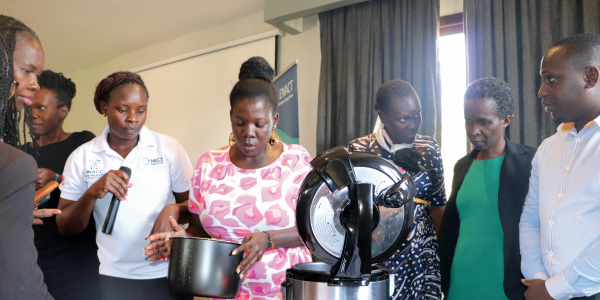ENACT project accelerates Uganda's clean cooking transition with capacity-building workshop in Kampala
In a dynamic collaboration, the Enabling African Cities for Transformative Energy Access project (ENACT) partnered with the Kampala Capital City Authority and Uganda’s Ministry of Energy and Mineral Development to deliver a game-changing capacity-building workshop on clean and modern energy cooking services in Kampala. Held in March 2023, the workshop aimed to enhance the public sector’s understanding and support for private sector-led clean cooking interventions, with a specific focus on urban informal settlements. With over 40 participants from diverse sectors, the workshop fostered a vibrant exchange of ideas and experiences.
During the interactive workshop, a striking disparity between population growth and access to clean cooking in sub-Saharan Africa, including Uganda, came to the forefront. Currently, less than 5% of Uganda's population has access to clean cooking. The detrimental impact of traditional cooking methods on climate, environment, gender, and health were discussed, bringing participants' first-hand experiences in sharp focus.
Distinguished Paediatrician, Dr. Rebecca Nantanda, shed light on the health risks associated with polluting fuel and stove technologies. Poorly ventilated conditions expose users to toxic substances, extending beyond visible smoke particles. Citing a recent study conducted in urban areas of Uganda, Dr. Nantanda highlighted that 18.9% of children in households exposed constantly to wood-based fuel experience shortness of breath. Importantly, Dr. Nantanda emphasised the broader development concerns tied to household air pollution, stating:
Household air pollution is not just a health-related problem but a development issue, intricately linked to poverty, health, and gender.
Engaging discussions during the workshop centred around the limitations of current clean cooking definitions. Participants raised concerns regarding the lack of standardisation, narrow focus on technology, limited consideration of local contexts, and the need for a stronger emphasis on user perspectives and needs. These obstacles hinder the effective implementation and monitoring of clean cooking interventions. Furthermore, the importance of the Multi-Tier Framework for cooking was highlighted —a comprehensive assessment tool that evaluates different levels of access to clean cooking solutions, taking into account attributes such as efficiency, exposure, affordability, safety, availability, and convenience. The application of this framework through participatory scenario exercises was explored and praised.
The practical demonstrations left a lasting impression on attendees as they experienced the remarkable taste, efficiency, and convenience of dishes prepared with a range of clean cookstoves. The attendees were captivated by the enhanced cooking experience, with significantly reduced cooking times and improved convenience. Ms. Sarah Babirye, Project Manager at the Uganda National Alliance on Clean Cooking, shared her personal transformation, exclaiming,
Gone are the days of spending 5 hours cooking beans on inefficient biomass cookstoves! Thanks to my electric pressure cooker, it now takes me just 45 minutes. I no longer have to rush after work to prepare dinner for my family because everything cooks much faster. It's truly a game-changer!
The Government of Uganda has displayed a resolute commitment to increasing access to clean and modern energy cooking services. Eng. Herbert Abigaba, Principal Energy officer in the Renewable Energy Department of the Ministry of Energy and Mineral Development, and focal person of the ENACT project, highlighted some of the actions the Government of Uganda is taking to drive the transition to clean and modern energy cooking services in the country. The Ugandan Government’s Third National Development Plan (2022-2027) sets targets to reduce biomass consumption for cooking and increase the use of improved charcoal cookstoves in schools and institutions. Additionally, initiatives are underway to distribute 1 million 13 kg LPG cylinders and develop an e-cooking strategy and implementation plan. The government has also implemented various incentives to encourage private-sector involvement, including VAT waivers, import tax reductions, and lifeline tariffs for cooking with electricity.
However, despite the government's commendable commitment, the workshop underscored the barriers that hinder the advancement of the clean cooking sector in Uganda, particularly in Kampala's informal settlements. Cultural norms, lack of awareness, and economic constraints were identified as key challenges, impeding the widespread adoption of clean cooking practices. Addressing these obstacles requires a comprehensive and collaborative approach involving government agencies, non-governmental organisations, stakeholders, and the community. The valuable insights gained from the workshop will shape the next phase of the ENACT project, focusing on engaging private sector actors, conducting awareness campaigns, and promoting the adoption of clean cooking practices.
ICLEI Africa and Mercy Corps Energy 4 Impact, as key implementers of the ENACT project, extend a call to action to stakeholders from the public, private, NGO, community-based organisations, philanthropists, and individuals to unite in scaling up the innovative models developed under ENACT. Interested parties are urged to join efforts in organising training workshops across various local government authorities and communities, enabling a widespread and meaningful transition to clean cooking in Uganda. Together, through collective efforts, a lasting and transformative impact can be achieved.
For more information on the ENACT project, visit the project page.
For a more comprehensive version of this article, please refer to the original publication on the ICLEI Africa website, available here.

